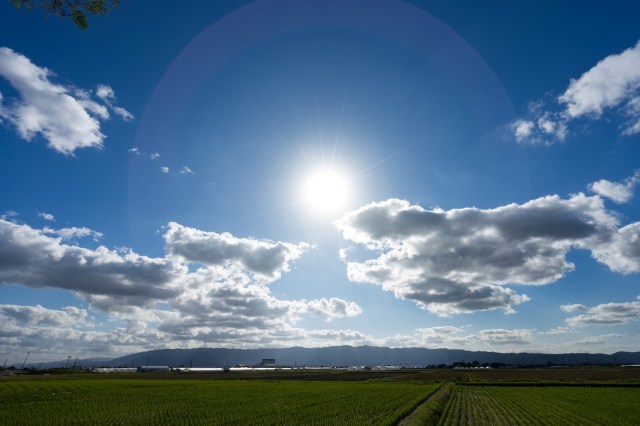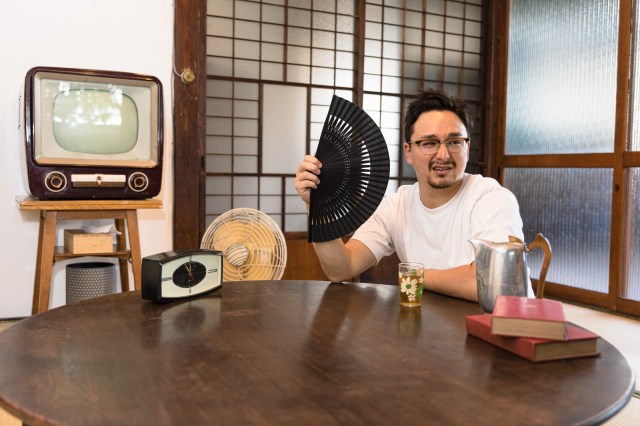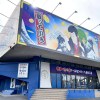
Public health agency pleads with one group to take simple but critical precaution against heatstroke.
“It’s not the heat, it’s the humidity” is usually an accurate explanation for the profuse perspiration that takes place during the summer months in Japan. This month, though, it’s the heat and the humidity, which is making things not only extra sweaty, but even dangerous.
Since early August, the country has been experiencing a severe heat wave, with daytime temperatures in Tokyo climbing to 35 or even 36 degrees Celsius (95/96.8 degrees Fahrenheit). That’s roughly five degrees hotter than normal, and the harsh conditions have led to 2,576 people in Tokyo’s 23 central wards so far this month being taken to the hospital for emergency heatstroke treatment, 339 of them on last Monday alone.
The more troubling statistic, though, is the 79 people who have died from heatstroke since the start of August. Making that even more tragic is that Tokyo’s Bureau of Social Welfare and Public Health thinks many of those deaths were preventable. All of those who passed away were aged 50 or older, and the vast majority, 65 of them, had not been running the air conditioner in their homes when their heatstroke symptoms became severe.
Despite Japan’s image as a country that loves producing and using the latest gadgets, it’s not uncommon for older Japanese people to have an aversion to technological creature comforts, especially if they weren’t in widespread use during their own childhoods. Many older senior citizens, especially those who grew up in rural areas or in the hard economic times of World War II and its immediate aftermath, made do without home air conditioners in their youth. Their perception of air conditioning as a frivolous luxury, and even a potential source of vaguely imagined health maladies if over-relied on, often continues into their old age, making them reluctant to switch on their AC no matter how hot it gets.
In this case, though, living like they did back in the good old days isn’t good for their health, and the anti-AC attitude becomes especially risky at night. Because of Japan’s high humidity in the summer, the temperature doesn’t dip all that low once the sun goes down, but many seniors are opposed to the idea of running the air conditioning while they sleep. Out of the 79 heatstroke deaths in which the time of death could be determined, more took place during the night (between 5 p.m. and 5 a.m.) than the day.
Even when elderly Japanese people can be convinced to turn on the AC, they don’t always turn it down enough. Last week, a 92-year-old man in Ishikawa Prefecture was taken by ambulance to the hospital for heatstroke treatment. When asked if he’d been using his air conditioner, the man replied that he had, but with it set to 31 degrees Celsius (87.8 degrees Fahrenheit).
With Japan’s heat wave expected to continue, the Bureau of Social Welfare and Public Health is cautioning citizens against trying to just tough it out, and urging them to use their air conditioners not for comfort, but for the sake of their own health and safety.
Sources: Jjji Tsushin via Livedoor News, Livedoor News/Hokuriku Shimbun
Top image: Pakutaso
Insert image: Pakutaso
● Want to hear about SoraNews24’s latest articles as soon as they’re published? Follow us on Facebook and Twitter!
Follow Casey on Twitter as he copes with the summer heat by regularly chomping on Garigari-kun and Ice Box.


 10 girls rushed to hospital for heatstroke after Tokyo high school’s non-air-conditioned assembly
10 girls rushed to hospital for heatstroke after Tokyo high school’s non-air-conditioned assembly Japanese summer is worse than summer in Death Valley, says our correspondent, a seasoned traveler
Japanese summer is worse than summer in Death Valley, says our correspondent, a seasoned traveler It’s so hot in Japan that people are cooking food in/on their cars【Photos】
It’s so hot in Japan that people are cooking food in/on their cars【Photos】 To prevent heatstroke and COVID-19, Ibaraki vending machines dispense free cold water to students
To prevent heatstroke and COVID-19, Ibaraki vending machines dispense free cold water to students Tokyo Olympics might allow you to take one, and only one, drink with you into sweltering stadiums
Tokyo Olympics might allow you to take one, and only one, drink with you into sweltering stadiums Hello, cosmetics! Clinique teams up with Hello Kitty this summer for first-time collaboration
Hello, cosmetics! Clinique teams up with Hello Kitty this summer for first-time collaboration Demon Slayer: Kimetsu no Yaiba gets new roller coaster attractions and food at Universal Studios Japan
Demon Slayer: Kimetsu no Yaiba gets new roller coaster attractions and food at Universal Studios Japan How to order snacks on a Shinkansen bullet train in Japan
How to order snacks on a Shinkansen bullet train in Japan High-fashion Totoro cuddle purse is like an elegant stroll in the forest【Photos】
High-fashion Totoro cuddle purse is like an elegant stroll in the forest【Photos】 Japan’s new difficult-to-drink-from beer glass protects your liver, but it’s a brutal experience
Japan’s new difficult-to-drink-from beer glass protects your liver, but it’s a brutal experience Kyoto Tower mascot termination reveals dark side behind cute Japanese characters
Kyoto Tower mascot termination reveals dark side behind cute Japanese characters Edible 10-yen coins become a hot new trend in Tokyo【Taste test】
Edible 10-yen coins become a hot new trend in Tokyo【Taste test】 Tsukiji Fish Market Vendor Releases Tuna For Home Assembly
Tsukiji Fish Market Vendor Releases Tuna For Home Assembly A visit to the best UFO catcher arcade in the universe!
A visit to the best UFO catcher arcade in the universe! New samurai glasses are Japan’s latest weird must-have souvenir
New samurai glasses are Japan’s latest weird must-have souvenir Nintendo history you can feel – Super NES, N64, and GameCube controllers become capsule toys
Nintendo history you can feel – Super NES, N64, and GameCube controllers become capsule toys “The most Delicious Cup Noodle in history” – Japan’s French Cup Noodle wins our heart【Taste test】
“The most Delicious Cup Noodle in history” – Japan’s French Cup Noodle wins our heart【Taste test】 Starbucks releases a cute Frappuccino and Unicorn Cake…but not in Japan
Starbucks releases a cute Frappuccino and Unicorn Cake…but not in Japan McDonald’s Japan’s Soft Twist Tower: A phantom ice cream only sold at select branches
McDonald’s Japan’s Soft Twist Tower: A phantom ice cream only sold at select branches Yabai Ramen: What makes this Japanese ramen so dangerous?
Yabai Ramen: What makes this Japanese ramen so dangerous? Finally! Nintendo Japan expands Switch 8-bit controller sales to everybody, Online member or not
Finally! Nintendo Japan expands Switch 8-bit controller sales to everybody, Online member or not Japanese government wants to build luxury resorts in all national parks for foreign tourists
Japanese government wants to build luxury resorts in all national parks for foreign tourists To combat declining birth rate, Japan to begin offering “Breeding Visas” to foreigners
To combat declining birth rate, Japan to begin offering “Breeding Visas” to foreigners 10 things you should buy at 7-Eleven in Japan
10 things you should buy at 7-Eleven in Japan Studio Ghibli releases anime heroine cosplay dresses that are super comfy to wear
Studio Ghibli releases anime heroine cosplay dresses that are super comfy to wear Woman charged for driving suitcase without a license in Osaka
Woman charged for driving suitcase without a license in Osaka Studio Ghibli unveils My Neighbour Totoro miniature house model
Studio Ghibli unveils My Neighbour Totoro miniature house model Kyoto experiencing problems with foreign tourists not paying for bus fares, but not on purpose
Kyoto experiencing problems with foreign tourists not paying for bus fares, but not on purpose Fighting mild hunger with a Japanese soda that turns into jelly in the stomach【Taste test】
Fighting mild hunger with a Japanese soda that turns into jelly in the stomach【Taste test】 Studio Ghibli’s Howl’s Moving Castle tapestry unveiled in Japan for first time
Studio Ghibli’s Howl’s Moving Castle tapestry unveiled in Japan for first time McDonald’s new Happy Meals offer up cute and practical Sanrio lifestyle goods
McDonald’s new Happy Meals offer up cute and practical Sanrio lifestyle goods Sales of Japan’s most convenient train ticket/shopping payment cards suspended indefinitely
Sales of Japan’s most convenient train ticket/shopping payment cards suspended indefinitely Sold-out Studio Ghibli desktop humidifiers are back so Totoro can help you through the dry season
Sold-out Studio Ghibli desktop humidifiers are back so Totoro can help you through the dry season Japanese government to make first change to romanization spelling rules since the 1950s
Japanese government to make first change to romanization spelling rules since the 1950s Foreigner’s request for help in Tokyo makes us sad for the state of society
Foreigner’s request for help in Tokyo makes us sad for the state of society Ghibli founders Toshio Suzuki and Hayao Miyazaki contribute to Japanese whisky Totoro label design
Ghibli founders Toshio Suzuki and Hayao Miyazaki contribute to Japanese whisky Totoro label design Doraemon found buried at sea as scene from 1993 anime becomes real life【Photos】
Doraemon found buried at sea as scene from 1993 anime becomes real life【Photos】 Tokyo’s most famous Starbucks is closed
Tokyo’s most famous Starbucks is closed Princesses, fruits, and blacksmiths: Study reveals the 30 most unusual family names in Japan
Princesses, fruits, and blacksmiths: Study reveals the 30 most unusual family names in Japan Three people die on Mt. Fuji less than 24 hours after official start of climbing season
Three people die on Mt. Fuji less than 24 hours after official start of climbing season A beginner’s summertime survival guide to Japanese air conditioners – 4 tips to fight the heat
A beginner’s summertime survival guide to Japanese air conditioners – 4 tips to fight the heat Japan’s new wearable air conditioner belt is here just in time for the Tokyo heat wave
Japan’s new wearable air conditioner belt is here just in time for the Tokyo heat wave Nintendo issues warning to make sure your Switch can handle the heat this summer
Nintendo issues warning to make sure your Switch can handle the heat this summer Here’s one of the first things you should do if you just moved into a new apartment in Japan
Here’s one of the first things you should do if you just moved into a new apartment in Japan Heatstroke countermeasures already being prepped for 2020 Olympics
Heatstroke countermeasures already being prepped for 2020 Olympics Young Japanese man dies while sunbathing in his home garden
Young Japanese man dies while sunbathing in his home garden What colors of clothing will keep you cooler in summer? Japanese researchers experiment
What colors of clothing will keep you cooler in summer? Japanese researchers experiment Tokyo too hot for you? It’s already snowing in Hokkaido, Japan’s northern island【Photos】
Tokyo too hot for you? It’s already snowing in Hokkaido, Japan’s northern island【Photos】 Too hot during the blackout? Cool down with an electric fan, veteran newscaster suggests
Too hot during the blackout? Cool down with an electric fan, veteran newscaster suggests Mt Fuji looks unusual, sparks fears of possible eruption
Mt Fuji looks unusual, sparks fears of possible eruption Japanese media finds out if it’s cold enough to “fry” an egg on the street in Hokkaido
Japanese media finds out if it’s cold enough to “fry” an egg on the street in Hokkaido Bottled hot water selling like bottled hot cakes in Japan
Bottled hot water selling like bottled hot cakes in Japan Twin-tailed flasher in Japan’s coldest prefecture may not understand how flashing works
Twin-tailed flasher in Japan’s coldest prefecture may not understand how flashing works
Leave a Reply